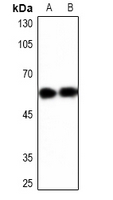Product Name :
YBX1 polyclonal antibody Background :
The Y-box binding protein 1 (YB1) belongs to a family of evolutionarily conserved, multifunctional Y-box proteins that bind single-stranded DNA and RNA and function as regulators of transcription, RNA metabolism, and protein synthesis . YB1 binds to Y-box sequences (TAACC) found in multiple gene promoters and can positively or negatively regulate transcription. YB1 activates genes associated with proliferation and cancer, such as cyclin A, cyclin B1, matrix metalloproteinase-2 (MMP-2), and the multi-drug resistance 1 (MDR1) gene . YB1 represses genes associated with cell death, including the Fas cell death-associated receptor and the p53 tumor suppressor gene . It also interacts with the RNA-splicing factor SRp30c and stabilizes interleukin-2 (IL-2) mRNA upon induction of T lymphocytes by IL-2 (. The majority of YB1 protein localizes to the cytoplasm, with a minor pool found in the nucleus; however, nuclear localization appears to be critical for its role in promoting proliferation. Nuclear translocation is cell cycle regulated, with YB1 protein accumulating in the nucleus during G1/S phase. In addition, nuclear translocation is induced in response to extracellular stimuli such as hyperthermia and UV irradiation, or treatment of cells with thrombin, interferons, or insulin-like growth factor (IGF-I) . Treatment of the MCF7 breast cancer cell line with IGF-I results in Akt-mediated phosphorylation of YB1 at Ser102, which is required for nuclear translocation of YB1 and its ability to promote anchorage-independent growth . Research studies have shown that YB1 is overexpressed in many malignant tissues, including breast cancer, non-small cell lung carcinoma, ovarian adenocarcinomas, human osteosarcomas, colorectal carcinomas, and malignant melanomas. Investigators have shown that nuclear YB1 expression correlates with high levels of proliferation, drug resistance, and poor tumor prognosis. Product :
Liquid in 0.42% Potassium phosphate, 0.87% Sodium chloride, pH 7.3, 30% glycerol, and 0.01% sodium azide. Storage&Stability :
Store at 4°C short term. Aliquot and store at -20°C long term. Avoid freeze-thaw cycles. Specificity :
Recognizes endogenous levels of YBX1 protein. Immunogen :
KLH-conjugated synthetic peptide encompassing a sequence within the center region of human YBX1. The exact sequence is proprietary. Conjugate :
Unconjugated Modification :
Unmodification
YBX1 polyclonal antibody Background :
The Y-box binding protein 1 (YB1) belongs to a family of evolutionarily conserved, multifunctional Y-box proteins that bind single-stranded DNA and RNA and function as regulators of transcription, RNA metabolism, and protein synthesis . YB1 binds to Y-box sequences (TAACC) found in multiple gene promoters and can positively or negatively regulate transcription. YB1 activates genes associated with proliferation and cancer, such as cyclin A, cyclin B1, matrix metalloproteinase-2 (MMP-2), and the multi-drug resistance 1 (MDR1) gene . YB1 represses genes associated with cell death, including the Fas cell death-associated receptor and the p53 tumor suppressor gene . It also interacts with the RNA-splicing factor SRp30c and stabilizes interleukin-2 (IL-2) mRNA upon induction of T lymphocytes by IL-2 (. The majority of YB1 protein localizes to the cytoplasm, with a minor pool found in the nucleus; however, nuclear localization appears to be critical for its role in promoting proliferation. Nuclear translocation is cell cycle regulated, with YB1 protein accumulating in the nucleus during G1/S phase. In addition, nuclear translocation is induced in response to extracellular stimuli such as hyperthermia and UV irradiation, or treatment of cells with thrombin, interferons, or insulin-like growth factor (IGF-I) . Treatment of the MCF7 breast cancer cell line with IGF-I results in Akt-mediated phosphorylation of YB1 at Ser102, which is required for nuclear translocation of YB1 and its ability to promote anchorage-independent growth . Research studies have shown that YB1 is overexpressed in many malignant tissues, including breast cancer, non-small cell lung carcinoma, ovarian adenocarcinomas, human osteosarcomas, colorectal carcinomas, and malignant melanomas. Investigators have shown that nuclear YB1 expression correlates with high levels of proliferation, drug resistance, and poor tumor prognosis. Product :
Liquid in 0.42% Potassium phosphate, 0.87% Sodium chloride, pH 7.3, 30% glycerol, and 0.01% sodium azide. Storage&Stability :
Store at 4°C short term. Aliquot and store at -20°C long term. Avoid freeze-thaw cycles. Specificity :
Recognizes endogenous levels of YBX1 protein. Immunogen :
KLH-conjugated synthetic peptide encompassing a sequence within the center region of human YBX1. The exact sequence is proprietary. Conjugate :
Unconjugated Modification :
Unmodification
-
 Western blot analysis of YBX1 expression in mouse brain (A), rat brain (B) whole cell lysates.
Western blot analysis of YBX1 expression in mouse brain (A), rat brain (B) whole cell lysates.
Bioworld Biotech only provide peptides for our antibodies and do not provide additional peptide customization services.
Price/Size :
USD 368/1mg/vial
Tips:
For phospho antibody, we provide phospho peptide(0.5mg) and non-phospho peptide(0.5mg).Describe :
Blocking peptides are peptides that bind specifically to the target antibody and block antibody binding. These peptide usually contains the epitope recognized by the antibody. Antibodies bound to the blocking peptide no longer bind to the epitope on the target protein. This mechanism is useful when non-specific binding is an issue, for example, in Western blotting (WB) and Immunohistochemistry (IHC). By comparing the staining from the blocked antibody versus the antibody alone, one can see which staining is specific; Specific binding will be absent from the western blot or IHC performed with the neutralized antibody.Formula:
Synthetic peptide was lyophilized with 100% acetonitrile and is supplied as a powder. Reconstitute with 0.1 ml DI water for a final concentration of 10 mg/ml.The purity is >90%,tested by HPLC and MS.
Storage:
The freeze-dried powder is more stable. For short time at 2-8°C. For long term storage store at -20°C.
Note :
This product is for research use only (RUO only). Not for use in diagnostic or therapeutic procedures.
 YBX1 polyclonal antibody
YBX1 polyclonal antibody  Datasheet
Datasheet COA
COA MSDS
MSDS SHIP
SHIP